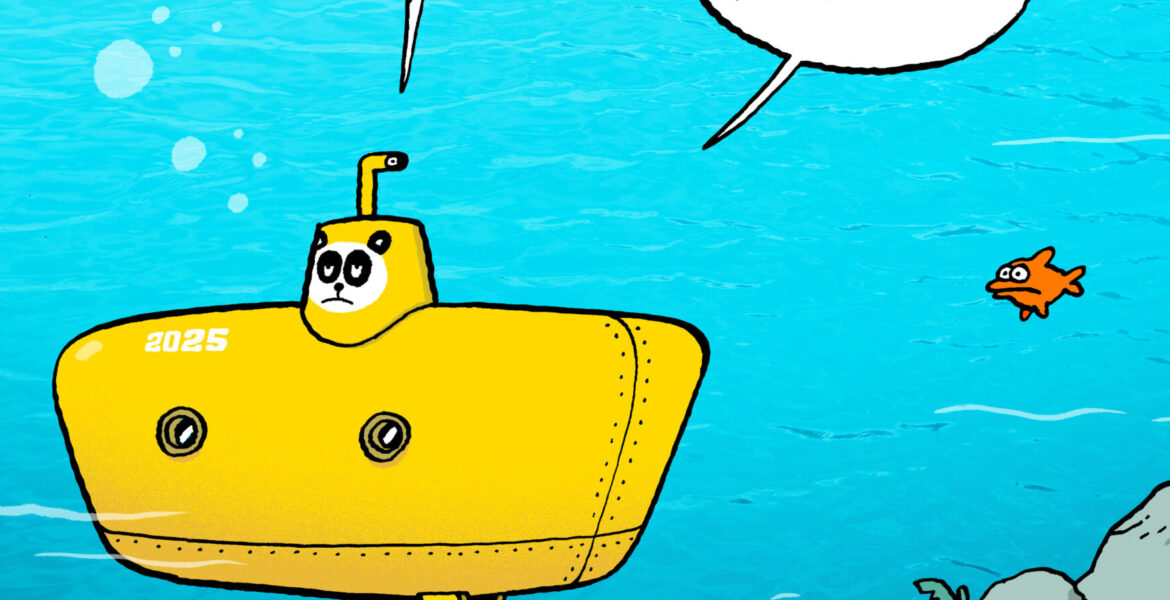Taiwan has teamed up with a top Belgian artist to draw attention to the emerging security concern of alleged sabotage of undersea cables.
A spokesman at the Taipei Representative Office in the EU and Belgium said that in order to highlight what it calls growing threats to undersea cable infrastructure it had teamed up with the award-winning Belgian cartoonist Lectrr to produce an attached illustration.
“We hope it draws attention to this issue in a particularly eye-catching way,” said the spokesman.
The issue was recently highlighted when a Chinese national was sentenced to three years in prison for damaging an undersea cable connecting Taiwan’s main island and the Penghu islands in the Taiwan Strait.
The man was the captain of the Togolese-registered vessel Hong Tai 58. The Tainan District Court’s verdict marks the first sentencing after reports in recent years of undersea cables around Taiwan being severed.
Despite robust and persistent Chinese denials, Taipei has accused Beijing of sabotaging its cables, describing it as a grey zone tactic to pressure the self-ruled island, which China claims as its territory. Undersea cables are fibre-optic cables laid on the ocean floor to transmit data between continents. They form the backbone of global internet and telecommunications, enabling high-speed connections for businesses, governments, and individuals.
These cables carry over 99 % of international data traffic, supporting everything from streaming and online banking to cloudcomputing. Built to withstand harsh underwater conditions, they are crucial for global connectivity and economic activity.
Windward, a leading maritime AI company, says these fibre-optic cables, laid on the ocean floor, enable high-speed internet, international phone calls, financial transactions, and cloud services that power the modern economy.
It says, “Without them, global trade, banking, and even national security operations would be significantly disrupted.”
“If undersea cables are sabotaged, the consequences can be severe across multiple sectors.”
Taiwan says it is highly reliant on undersea cables for its internet and communication, making it vulnerable to disruptions from external forces. Recent incidents have highlighted these vulnerabilities and prompted Taiwan to take steps to reduce its reliance on these cables.
Commentators say that if sabotage is suspected, it could escalate conflicts between nations and a hostile state or group could use cable sabotage as a form of hybrid warfare, disrupting adversaries without direct military engagement.
Also, if cables are tampered with, data interception or cyber espionage could occur and some GPS-related military applications, that rely on undersea cable-backed infrastructure, could be disrupted.
According to the International Cable Protection Committee, about 150 to 200 faults occur across the world’s undersea cable systems every year.
Taiwan has 10 domestic and 14 international undersea cables and the court heard that the damage to cables linking Taiwan to the Penghu islands seriously interferes with the government and society’s operations.
Taiwan relies on a network of international and domestic undersea cables for global connectivity; these cables are crucial for communication, economic activity, and national security.
In early 2023, Chinese-registered vessels are reported to have severed 2 undersea cables, knocking Taiwan’s Matsu Islands offline. China’s explanation was that such incidents were inevitable and natural maritime accidents.
However, the Global Taiwan Institute says that, given that the Taiwan Strait is one of the world’s busiest waterways, with more than 1,000 cargo ships passing through weekly, accidental damage by anchors or fishing nets is not impossible. However, more recent disruptions, and Chinese-flagged vessels lingering near key cable locations suggest a more disturbing pattern, it states.
Today, undersea cables carry 99% of international digital data, yet this critical infrastructure faces growing threats across multiple regions around the world. The Taiwan Strait and the Baltic Sea are two areas particularly under threat, as they are situated in areas subject to potential conflict.
Over recent years, Taiwan alleges that this threat has increasingly become a reality as the number of suspicious incidents targeting undersea cables has spiked in both regions.
Taiwan cites one recent example as the Chinese national who was sentenced to three years in prison for damaging cables.




